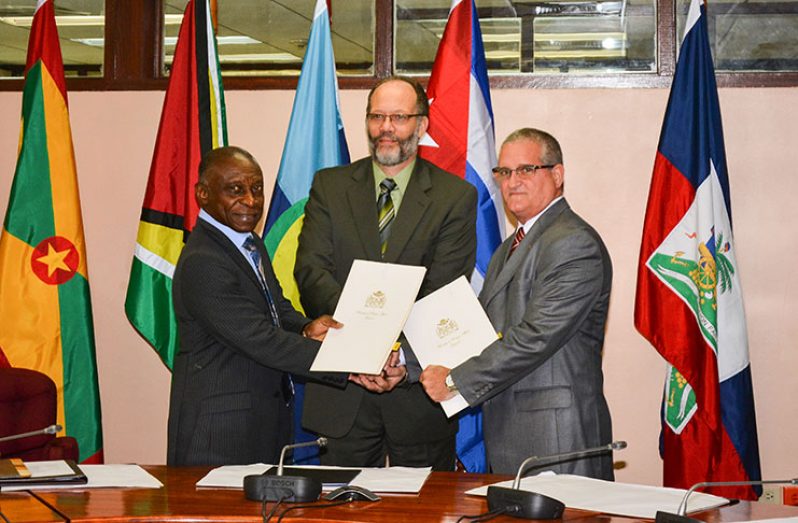THE long-awaited project, which will see the creation of a training centre for children and youths with disabilities, will soon come on stream with the Caribbean Community (CARICOM), Guyana and Cuba signing a tripartite agreement to initiate the process.
The agreement was signed on Thursday by CARICOM’s Secretary-General Irwin LaRocque, Guyana’s Foreign Affairs Minister Carl Greenidge and Cuba’s Ambassador Julio Cesar Gonzalez Marchante at the CARICOM Secretariat, Turkeyen, Greater Georgetown.
Putting the project into context, Minister Greenidge recalled that it was in December, 2011, during the Fourth CARICOM-Cuba Summit in Trinidad and Tobago that the Government of Cuba had proposed, for joint execution with the region, a number of projects aimed at strengthening the CARICOM-Cuba programme of cooperation. The following year, Guyana at the Fifteenth Meeting of the Council for Foreign and Community Relations (COFCOR) had agreed to take up the lead role in the execution of the project for the creation of the training centre.
“This project is sustained by innovative thinking and valuable support that has characterised cooperation between Cuba and the Region,” Minister Greenidge posited minutes before signing the agreement.
With a tripartite agreement now in place, the Foreign Affairs Minister expressed the view that the work of the oversight committee, which was established, will now be accelerated.
“It is expected that the work of that committee will now intensify as we move towards implementation of the project,” Minister Greenidge posited. The oversight committee comprises representatives of the Ministries of Foreign Affairs; Public Health, Education, Human Services and Social Security, the National Commission on Disability, and CARICOM.
It was established to examine, monitor and make recommendations for the execution of this project for the creation of the training centre.
CARICOM’s Secretary-General, delivering brief remarks, said the agreement was being signed on a day set aside to celebrate the relations shared between the Region and Cuba – CARICOM-Cuba Day.
The Caribbean Community, he said, has lost a true friend, making reference to the recent passing of former president of Cuba, Fidel Castro Ruz.
“President Castro’s commitment to assist developing countries through the sharing of his country’s skills and expertise made him such a treasured ally of our Region, that he is the only non-CARICOM recipient of our highest award, the Order of the Caribbean Community.
Thousands of our citizens have benefitted in many ways from his dedicated friendship and that of the Cuban people to our Community. His friendship with the Community was rooted in his appreciation for the courage of the then four independent member states of CARICOM in breaking the hemispheric diplomatic isolation of his country in 1972,” Ambassador LaRocque said.
He too recalled that it was two years ago, that during the Fifth CARICOM-Cuba Summit in Havana, it was proposed that Cuba would co-operate with CARICOM in nine specific areas, including the creation of the Training Centre for the Treatment of Physical Disabilities to assist physically challenged children and youths.
More than two years after, the Secretary-General said he is satisfied that the agreement will now pave the way for this “most desirable project” to be implemented here in Guyana.
“This project emphasises the interest of all parties to address a very important social and humanitarian challenge facing the Region. It aims to use Cuba’s extensive experience in this area to assist CARICOM member states in improving the lives of a vulnerable sector of our population,”the Ambassador said.
On behalf of the Community, Ambassador LaRocque expressed heart-felt gratitude to the Government and the People of Cuba for their generosity. Guyana was also applauded for taking up the challenge to spearhead the project.
Still shocked over the recent passing of the Commander-in-Chief and leader of the Cuban Revolution, Fidel Castro Ruz, the Cuban Ambassador also took stock of the fact that the agreement was being signed on the 44th Anniversary of the establishment of diplomatic relations between CARICOM and Cuba, of which Castro was and will continue to be the architect of its unity.
“We recall with gratitude on December 8, 1972, when four Caribbean nations – Barbados, Guyana , Jamaica and Trinidad and Tobago – simultaneously decided to establish full diplomatic relations with Cuba. On that occasion of the First CARICOM-Cuba Summit held in Havana in 2002, Commander-in-Chief Fidel Castro said that ‘this decision, of unquestionable political courage, adopted by newly independent small countries in a hostile environment and under great pressure, was a fundamental step towards breaking the diplomatic and commercial blockade against Cuba in the Region and a breach against the isolation they had subjected us though the OAS. Cuba will never forget the noble gesture of its Caribbean brothers,” Ambassador Gonzalez Marchante.
Turning his attention to the project, the Cuban Ambassador said Guyana’s decision to accommodate the regional project here, is an indication of its commitment not only to the local disability sector, but also to all the countries of the Region.
While the centre will be located in Guyana, Cuba will provide the technical assistance needed.
“We want, in this way, to contribute to the right of all to receive the education and preparation necessary for life and to the principles of solidarity and internationalism that guide the daily actions of Cubans, notwithstanding the difficulties and policies to which [we] are subjected as the unjust blockade that has been imposed on us for decades and that the world and the Caribbean community have firmly denounced and called for its end,” he said.
The centre, when established, will provide for the Psycho-educational treatment for children, adolescents and youths with disabilities and will fortify the pedagogic preparation and didactic skills of the teachers.
Additionally, it will serve to empower families, specialists and the Community to improve prevention, rehabilitation and socio-professional integration of the disabled population.
Here in Guyana, the Public Health Ministry will be taking the lead role in management of the centre, which will be located at the Cyril Potter College of Education (CPCE).



.jpg)










